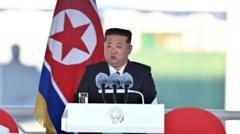The sanctions reflect a significant escalation in international response to ongoing violence in Sudan, as the U.S. aims to hold military leaders accountable for violations of international law.
**U.S. Government Targets Sudan with Sanctions Following Chemical Weapons Allegations**

**U.S. Government Targets Sudan with Sanctions Following Chemical Weapons Allegations**
The State Department announced new sanctions against Sudan's military-led government, citing evidence of chemical weapons use against paramilitary forces.
In a significant move, the United States plans to impose sanctions on the Sudanese military-led government for allegedly utilizing chemical weapons in its ongoing conflict. The State Department's announcement on Thursday follows a determination made by U.S. officials who reported that Sudan's military had employed these banned weapons during recent confrontations with the Rapid Support Forces (R.S.F.), a rival paramilitary group.
Although the State Department provided limited details regarding the nature or specifics of the alleged chemical weapons use, it confirmed that it had informed Congress about a potential violation of the Chemical Weapons Convention, an international treaty prohibiting the production or usage of chemical arms. The New York Times further revealed that Sudan's military reportedly resorted to using chlorine gas against R.S.F. troops on multiple occasions in remote areas of the country, raising concerns of similar tactics potentially being deployed in the capital, Khartoum, which has been at the center of the conflict.
These sanctions are expected to be enacted by June 6, with the Sudanese government yet to make an official comment on the U.S. announcement. The military has consistently denied these allegations of chemical weapon usage, despite rising skepticism among Sudanese citizens, many of whom noted the lack of local media coverage on the issue. U.S. officials attributed this silence to the small-scale usage of the weapons and their ineffective deployment in less populated areas.
The backdrop of this announcement is a civil war that has escalated dramatically since April 2023, resulting in tens of thousands of deaths and displacement of approximately 13 million individuals, alongside significant food shortages. Both the Sudanese military and R.S.F. have faced accusations of committing war crimes during the protracted violence. Notably, the R.S.F. has drawn specific condemnation from the U.S. for genocide, leading to sanctions imposed on its leader, Lt. Gen. Mohamed Hamdan, earlier this year.
Additionally, sanctions targeting Sudan's army chief, Gen. Abdel Fattah al-Burhan, were enacted after allegations arose that he authorized the use of chemical weapons. The recent announcement marks a pivotal moment in the U.S. response to the ongoing conflict, promising to restrict Sudan's access to U.S. exports and loans, emphasizing the commitment to holding leaders accountable for the proliferation of chemical weapons.
Although the State Department provided limited details regarding the nature or specifics of the alleged chemical weapons use, it confirmed that it had informed Congress about a potential violation of the Chemical Weapons Convention, an international treaty prohibiting the production or usage of chemical arms. The New York Times further revealed that Sudan's military reportedly resorted to using chlorine gas against R.S.F. troops on multiple occasions in remote areas of the country, raising concerns of similar tactics potentially being deployed in the capital, Khartoum, which has been at the center of the conflict.
These sanctions are expected to be enacted by June 6, with the Sudanese government yet to make an official comment on the U.S. announcement. The military has consistently denied these allegations of chemical weapon usage, despite rising skepticism among Sudanese citizens, many of whom noted the lack of local media coverage on the issue. U.S. officials attributed this silence to the small-scale usage of the weapons and their ineffective deployment in less populated areas.
The backdrop of this announcement is a civil war that has escalated dramatically since April 2023, resulting in tens of thousands of deaths and displacement of approximately 13 million individuals, alongside significant food shortages. Both the Sudanese military and R.S.F. have faced accusations of committing war crimes during the protracted violence. Notably, the R.S.F. has drawn specific condemnation from the U.S. for genocide, leading to sanctions imposed on its leader, Lt. Gen. Mohamed Hamdan, earlier this year.
Additionally, sanctions targeting Sudan's army chief, Gen. Abdel Fattah al-Burhan, were enacted after allegations arose that he authorized the use of chemical weapons. The recent announcement marks a pivotal moment in the U.S. response to the ongoing conflict, promising to restrict Sudan's access to U.S. exports and loans, emphasizing the commitment to holding leaders accountable for the proliferation of chemical weapons.



















